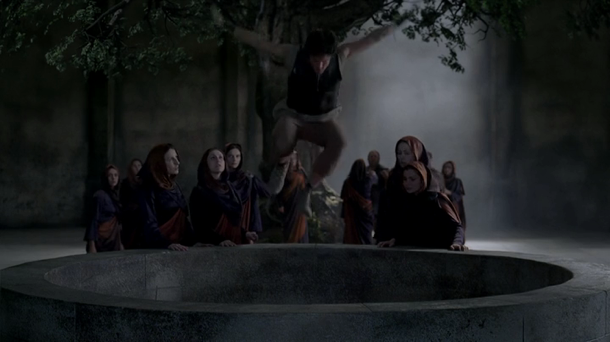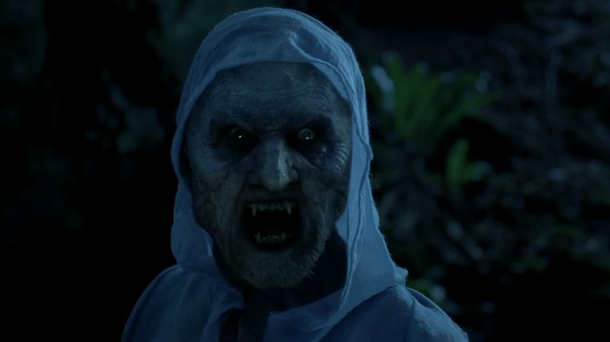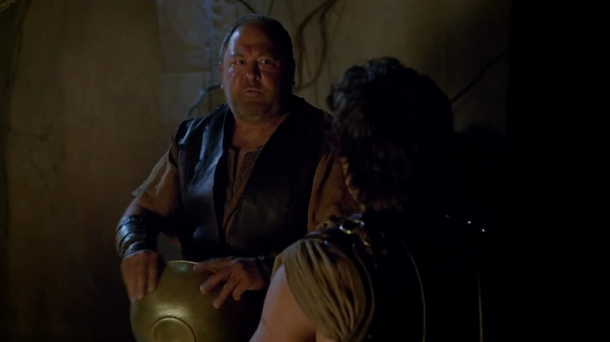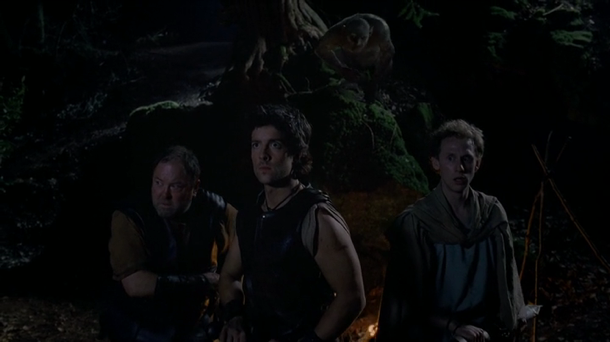Why you can trust GamesRadar+
Atlantis 1.02 “A Girl By Any Other Name” TV REVIEW

Episode 1.02
Writer: Howard Overman
Director: Justin Molotnikov
THE ONE WHERE Jason, Hercules and Pythagoras go to rescue a girl from the Maenads, but come back with a different girl – Medusa.
VERDICT Atlantis builds solidly on its premiere, playing to its strengths, introducing a few new intriguing elements and managing a few surprises along the way. On the other hand, it remains a show which feels as much defined by what it isn’t as much as what it is. And no, that’s not a just a chance to make a cheap gag about it not being Merlin .
For s start, let’s have a look at the regular opening titles, which make their debut this week: lots of watery imagery that plays into the myths of Atlantis as we know them. The show itself, however, seems to suffer some form of aquaphobia; the city is dusty, surrounded by deserts and distinctly unwatery.
Also, the city is represented in the credits by a sole shot, far in the distance. For a show called Atlantis , the city itself is getting a bit of a raw deal, and it’s notable that this episode even lacks an appearance by its King and Queen. You’d have thought that in its second week the show might take the opportunity to flesh out its main location a little more, but no; already our heroes are on missions that take them away from Atlantis.
The other thing that conspicuous by its absence is Jason feeling at all like a “man out of time”. Despite his occasional protestations to the contrary, he seems to have slotted into ancient Greece with astounding ease. He hasn’t even questioned how he can speak ancient Greek yet or complained about the lack of wi-fi or toilet rolls.

Let’s not harp on about that, though, because it’s like moaning that Merlin never had enough magic. It’s just something we’ll have to accept is part of the show’s DNA and enjoy what we do get instead. And what we get here is a decent action adventure romp, a lot of amusing dialogue between the three lead heroes, some seriously mean-ass warrior women, a couple of great fight scenes and a feisty new regular character in Medusa (it’s s shame she’s been so woefully underused since, because Jemima Rooper – previously best known for Hex and Lost In Austen – is great here).
Hercules still nabs all the best lines, though he also has to endure being “kissed” by a goat. Pythagoras is still adorably geeky. Jason is still great at the action scenes but oddly stiff when he has to chat up Ariadne. The CG satyrs are a bit rubbish, but the fact that they’re scared of Jason adds a new layer of mystery to the show. It’s a refreshing surprise that Jason and co don’t rescue the girl they’re supposed to; when Demetria escapes them and willingly returns to the Maenads it’s a pleasantly unexpected development.
The most interesting aspect of the episode, though, comes right at the end. Having said that the show doesn’t capitalise on the fact that Jason is from the future, it does at least make it clear that he knows what is destined to become of Medusa (he probably saw Clash Of The Titans ). Can he change her fate? Is it already too late (presumably the curse placed upon her by Head Maenad will have some bearing on her becoming a hairdresser’s worst nightmare)? On the other hand, he might bear in mind that it was him – and not Theseus – who killed the Minotaur in this reality, so why should any of the myths he knows pan out as he recalls them? Not that any of this will be mentioned again for weeks…
DESTINY/FATE COUNT Seven mentions (going into overdrive in the final scene).

MYTHBUSTERS In Greek mythology the Maenads were – as stated in this episode – the followers of Dionysus, the god of wine and wine making, and their name means “raving ones”. Satyrs also hung around with Pan and Dionysus, though they were more like fauns than the monkey creatures portrayed here.
Medusa also mentions a city called Helios, presumably her world’s name for Heliopolis, of City Of Helios (God of the sun), which was in ancient Egypt.
Medusa prevents herself being indoctrinated by the Maenads’ chanting by putting wax in her ears; this is presumably inspired by the tale of Odysseus’s crew preventing themselves from being enchanted by the Sirens by placing wax in their ears.
BROMANCE? “You have been a good and loyal friend, Pythagoras,” says Hercules, to which Pythagoras replies: “And you have often been a terrible friend, but I would rather spend my last moments with you than with anyone else.” Are we sensing some unrequited love between Pythagoras and Hercules? From Pythagoras’s point of view, anyway. Hercules is more interested in Medusa and looks a little embarrassed by the hug.

BEST MOMENT Hercules clouting Demetria over the head with a bowl, rather than waiting for Jason to appeal to her better nature. “You’re carrying her,” he adds.
BEST LINE
Hercules: “Finding boredom in one’s work is to be relished. It means you’re being paid for doing nothing. What could be better?”
Dave Golder
• Atlantis is currently airing in the UK on BBC One, Saturday evenings
• Read our other Atlantis season one reviews

Dave is a TV and film journalist who specializes in the science fiction and fantasy genres. He's written books about film posters and post-apocalypses, alongside writing for SFX Magazine for many years.



